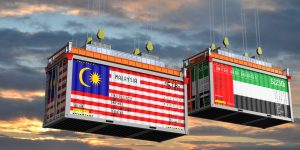Malaysia and the United Arab Emirates (UAE) are on the cusp of finalizing a free trade agreement and should have it squared away by June, Malaysia’s trade minister said yesterday.
In an interview with Reuters in Abu Dhabi, Malaysian Trade Minister Tengku Zafrul Aziz said that the two sides were “in the last round of discussions,” adding that the deal could help Malaysia become a hub for UAE investments in Asia.
Last May, Malaysia and the UAE agreed to begin negotiating a Comprehensive Economic Partnership Agreement (CEPA), a type of free trade deal that “aims to deepen ties with strategic partners around the world.” The UAE signed its first CEPA with India in early 2022, and has since signed agreements with Israel (May 2022), Indonesia (July 2022), Turkey (March 2023), and Cambodia (June 2023).
The economic relationship between Malaysia and the UAE is not massive, but has grown appreciably in recent years. Bilateral trade came to $2.2 billion during the first half of 2023, exclusive of oil imports. In a statement last year, UAE Trade Minister Thani Al Zeyoudi said that the country accounted for 32 percent of Malaysia’s trade with Arab countries, making it Malaysia’s second-largest trade partner in the Middle East and its 17th-largest globally. The relationship is also marked by considerable amounts of investment. In his statement, Zeyoudi said the UAE and Malaysia Malaysian investments in the UAE stand at $150 million, and UAE investments in Malaysia stand at $220 million, he said.
If and when a CEPA is signed, Malaysia hopes that it will open the way to further UAE investments in various sectors of the country’s economy, including in energy, electric vehicles, and microchips, Reuters reported. It noted that the Mubadala Investment Company, one of Abu Dhabi’s three sovereign wealth funds, is already an investor in Malaysia, including in the energy sector. Via its subsidiary Mubadala Energy, the firm operates and holds a majority stake in the Pegaga gas field off the coast of Sarawak, which started producing gas in 2022.
The impending CEPA reflects Malaysia’s growing economic linkages with the Middle East, particularly the wealthy and increasingly dynamic economies of the Gulf. Since taking office in late 2022, Prime Minister Anwar Ibrahim has pledged to strengthen relations with the region, and to establish Malaysia as its economic bridgehead in the fast-growing Asia-Pacific. This has also involved efforts to improve ties with Saudi Arabia, which had been harmed by the 1MDB corruption scandal. (Former Prime Minister Najib Razak said that a “Saudi Arabian prince” had deposited $100 million into his personal bank account, leading to attacks on the country from leading politicians, including then Prime Minister Mahathir Mohamad.)
Ahead of his first state visit to Saudi Arabia in March of last year, Anwar said that he was “committed to elevating the brotherly relations with the Kingdom to a higher level, especially in trade, investment, education, and culture as well as exploring new potential areas of cooperation.”
Malaysia has also launched negotiations for a free trade pact with the Gulf Cooperation Council, which in addition to the UAE, includes Saudi Arabia, Kuwait, Qatar, Bahrain, and Oman as members, but progress on this has been sluggish and the talks now appear to be on hold.

































